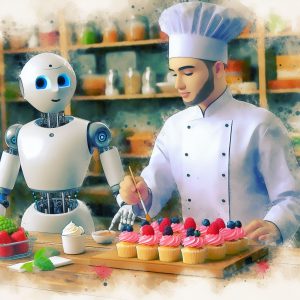In the not-so-distant future, you may be able to get your morning coffee from an AI-powered barista.
These AI-powered coffee shops are still in their early stages of development, but they have the potential to revolutionize the way we get our coffee.
How do AI-powered coffee shops work?
AI-powered coffee shops use artificial intelligence to automate the coffee-making process. This means that customers can order their coffee through a mobile app or kiosk, and the AI system will prepare the coffee without any human interaction.
The AI system is trained on a large dataset of coffee recipes and brewing techniques. It uses this data to create a custom coffee drink for each customer, based on their preferences.
The benefits of AI-powered coffee shops
There are several benefits to using AI-powered coffee shops, including:
- Convenience: AI-powered coffee shops are more convenient than traditional coffee shops. Customers can order their coffee through a mobile app or kiosk, and they can pick up their order without having to wait in line.
- Speed: AI-powered coffee shops are faster than traditional coffee shops. The AI system can prepare a coffee drink in a matter of seconds.
- Consistency: AI-powered coffee shops produce consistent results. The AI system is always able to make the same coffee drink, regardless of who is operating it.
- Personalization: AI-powered coffee shops can personalize coffee drinks to each customer’s preferences. The AI system can learn about each customer’s preferences and make recommendations for new drinks.
The future of baristas
The rise of AI-powered coffee shops is likely to have a significant impact on the role of baristas. In the future, baristas may be responsible for more than just making coffee. They may also be responsible for maintaining the AI system, developing new coffee recipes, and training new employees.
While AI-powered coffee shops may eventually replace traditional coffee shops, it is unlikely that they will completely eliminate the need for baristas. Baristas will still be needed to provide customers with personalized service and to ensure that the AI system is operating properly.
AI-powered coffee shops are a new and emerging technology that has the potential to revolutionize the way we get our coffee. These coffee shops offer several benefits over traditional coffee shops, including convenience, speed, consistency, and personalization. While AI-powered coffee shops may eventually replace traditional coffee shops, it is unlikely that they will completely eliminate the need for baristas.
Title: Exploring the Changing Landscape of Barista Jobs in the Food Industry: AI’s Impact and Adaptations Needed
The food industry is undergoing a significant transformation with the rise of artificial intelligence (AI). The barista profession, known for its skilled coffee preparation and customer interactions, is also affected by these technological advancements. This blog delves into the potential dangers that AI brings to barista jobs, the possibility of AI replacing baristas entirely, how AI can be used as an asset in the role, and how baristas can adapt to the changing work landscape.
- Dangers of AI to Barista Jobs:
a. Automation Threat: AI-powered coffee machines can perform tasks traditionally done by baristas, such as grinding beans, extracting espresso, and steaming milk, raising concerns about job displacement.
b. Reduced Human Interaction: With AI machines taking over some barista tasks, there is a risk of reducing human interaction and diminishing the personalized experience customers often associate with coffee shops. - Possibilities of AI Replacing Baristas:
a. Limited Scope of AI: It is unlikely that AI will completely replace baristas in the foreseeable future. AI machines are still limited in their ability to replicate the creativity, social skills, and problem-solving capabilities of human baristas.
b. Consumer Preference for Human Touch: Many coffee enthusiasts prefer the human element in brewing and serving coffee. The emotional connection and personalized service offered by baristas are crucial aspects of the coffee shop experience. - Potential Benefits of AI in Coffee Shops:
a. Efficiency and Consistency: AI-powered coffee machines can automate tasks, increasing efficiency and consistency in coffee preparation. Baristas can focus more on customer service and creating innovative drinks.
b. Data-Driven Insights: AI can analyze customer data, such as preferences and consumption patterns, to personalize recommendations and improve the overall customer experience.
c. Enhanced Skills and Training: AI can be used to create interactive training programs for baristas, helping them develop their skills and stay up-to-date with industry trends. - Adapting to the Changing Landscape:
a. Embracing Technology: Baristas should embrace AI technology as a tool to enhance their skills and improve the overall customer experience. They can learn to operate and maintain AI coffee machines, leveraging their knowledge to create better drinks.
b. Focus on Customer Service: Baristas should excel in customer service and interpersonal skills to differentiate themselves from AI. They can engage in conversations, provide personalized recommendations, and create a welcoming atmosphere.
c. Skill Development and Innovation: Baristas should continuously develop their skills, stay updated on coffee trends, and experiment with new recipes and techniques to remain relevant and valuable to customers.
Conclusion:
The integration of AI into the food industry presents both challenges and opportunities for baristas. While AI has the potential to automate certain tasks, it is unlikely to replace the human element entirely. Adapting to the changing landscape requires baristas to embrace technology while focusing on their customer service skills, skill development, and innovation. By leveraging AI’s capabilities, baristas can enhance their roles and continue providing exceptional coffee experiences in the face of technological advancements.



